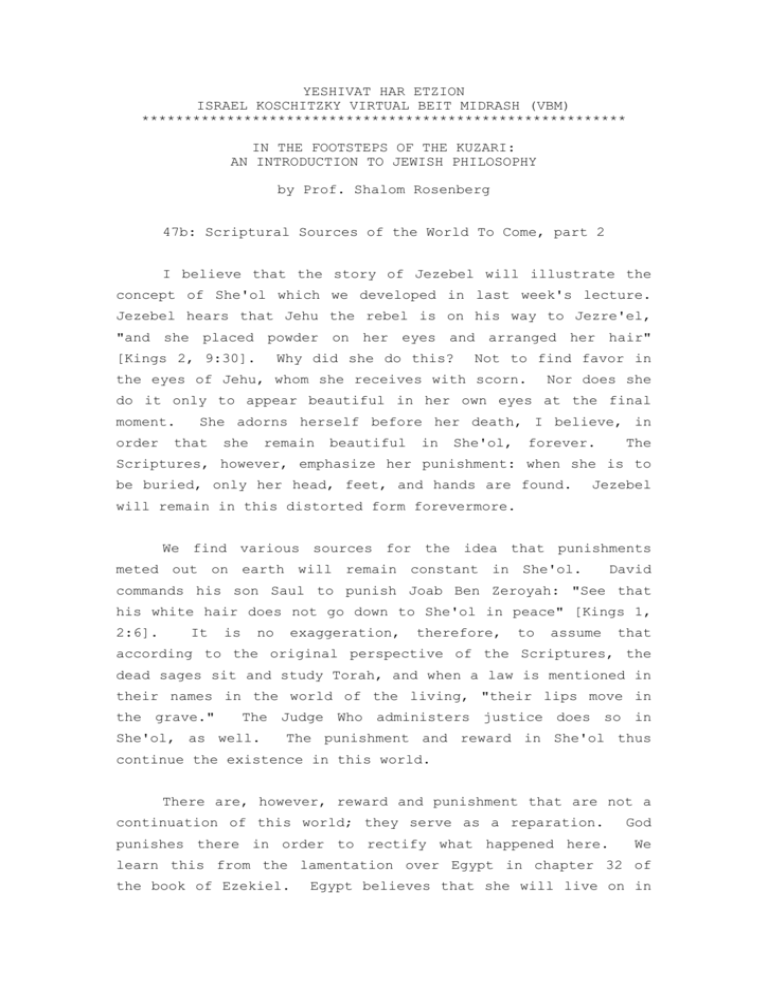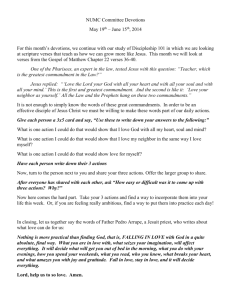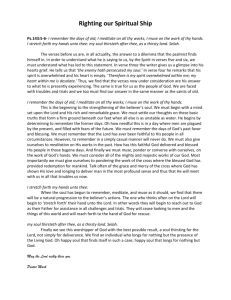47b: ?
advertisement

YESHIVAT HAR ETZION ISRAEL KOSCHITZKY VIRTUAL BEIT MIDRASH (VBM) ********************************************************* IN THE FOOTSTEPS OF THE KUZARI: AN INTRODUCTION TO JEWISH PHILOSOPHY by Prof. Shalom Rosenberg 47b: Scriptural Sources of the World To Come, part 2 I believe that the story of Jezebel will illustrate the concept of She'ol which we developed in last week's lecture. Jezebel hears that Jehu the rebel is on his way to Jezre'el, "and she placed powder on her eyes and arranged her hair" [Kings 2, 9:30]. Why did she do this? Not to find favor in the eyes of Jehu, whom she receives with scorn. Nor does she do it only to appear beautiful in her own eyes at the final moment. order She adorns herself before her death, I believe, in that she remain beautiful in She'ol, forever. The Scriptures, however, emphasize her punishment: when she is to be buried, only her head, feet, and hands are found. Jezebel will remain in this distorted form forevermore. We find various sources for the idea that punishments meted out on earth will remain constant in She'ol. David commands his son Saul to punish Joab Ben Zeroyah: "See that his white hair does not go down to She'ol in peace" [Kings 1, 2:6]. It is no exaggeration, therefore, to assume that according to the original perspective of the Scriptures, the dead sages sit and study Torah, and when a law is mentioned in their names in the world of the living, "their lips move in the grave." The Judge Who administers justice does so in She'ol, as well. The punishment and reward in She'ol thus continue the existence in this world. There are, however, reward and punishment that are not a continuation of this world; they serve as a reparation. God punishes there in order to rectify what happened here. We learn this from the lamentation over Egypt in chapter 32 of the book of Ezekiel. Egypt believes that she will live on in She'ol as a valorous warrior, yet the prophet mandates that the appropriate location for her is "among the dead by the sword" [32:21]. This serves as punishment for their "placing fear in the hearts [lit: land] of the living" [32:23]. The prophet teaches us that there is no correspondence between a person's fate in She'ol and the circumstances succeeding his death. A person's fate in She'ol is determined by his behavior throughout his life. Thus the prophet writes, "and warriors... who have gone down to She'ol will not lie wearing their implements of war, and they will place their swords under their heads." upon their bones..." Instead, "their sins will be [inscribed] - the sins of the evildoers will be inscribed upon their bones and remain with them forever. This leads us to the concept of various "chambers" in She'ol. This belief is found explicitly in the apocryphal and Midrashic literature, whose descriptions are consistent with the Scriptural [Hanoch 1:22] account. states For that example, springs of the book water righteous, since She'ol is made of chambers. of shine Hanoch for the As we shall see, the righteous will be redeemed and returned to the Garden of Eden from this same She'ol, if they triumph on the day of judgment. Returning to the prophecy of Ezekiel, the prophet repeats over and over again, in various forms, the call to Pharaoh: "who are you more pleasant than? the uncircumcised" [Ezekiel 32:19]. ...Go and lie among Pharaoh hopes to dwell in a special chamber, and the prophet sends him to the chamber of the uncircumcised! This reminds us of the idea of "karet," being "cut off," as opposed to the blessing that the righteous person is "gathered to his people." The arrangement of the graves symbolizes existence in She'ol. This accounts for the forefathers' desire buried in the Holy Land (compare also to Amos 2:1). to be The burial of Elisha and the resurrection of the dead that he performs after his own demise further demonstrate this concept. No other person can dwell with Elisha in the same grave, since no one is as holy as Elisha; therefore the dead person arose immediately upon his contact with Elisha's corpse [Kings 2, 13:21]. The fate of the deceased's children and their recollection of him also affect the soul after death, as is clear from many verses in the Scriptures. Thus, when God "visits the sins of the fathers upon the sons," or "remembers lovingkindness for thousands of generations," He causes the parents to children. and God actually suffer through suffering of their Rachel cries over her children [Jeremiah 31:14], comforts her, "there is hope for your final end" [ibid., 15]. These two words - "tikva" (hope) and "acharit" (end) may very well refer to existence after life. If with respect to the living hope expresses itself in the anticipation for eternal life, then for the dead, hope means the yearning for resurrection: there is hope for the final end of Man. Indeed, this belief arises in a number of places in the Scriptures and its most direct formulation is, "God puts to death and resurrects, brings [souls] down to She'ol and raises them up" [Samuel 2, 2:6 and elsewhere]. Even if we understand these verses as mere literary imagery to express the healing of sickness, the protection from the danger of death and travail, etc., if we compare it to another figurative phrase, such as "all those who enter shall never return," (Proverbs 2:19) we will see that our expression must also refer to a description of reality. If not, what significance is there to the imagery employed? Escape from She'ol Until this point we have looked at various Scriptural mentions of She'ol. I would like now to discuss a different idea: the release from She'ol. As we see in various places in the book of Psalms, the righteous person will be redeemed from She'ol. God will remove him from She'ol and bring him close to the Almighty Himself. There he will bind his soul in the bonds of life, and it will live forever. Man will not die, or if he does, God will then bring him up, and he will live a new life, an immortal life. Other verses in Psalms suggest this possibility, as well. "Therefore my heart will rejoice...even my flesh will dwell in security, for You [Psalms 16, 9-11]. will not abandon my soul in She'ol..." Realizing that the soul's existence in She'ol, which has dominion over the dead, hides the vision of God from the human soul after death, the psalmist prays that he may enjoy the divine presence forever. These verses clearly relate to the vision of personal redemption, part of the ancient Oral Torah. The most obvious Scriptural symbol of the soul in She'ol is Jonah in the belly of the whale. If we turn the parable into reality, we can perceive more clearly the fate of the soul in the misery of the bowels of She'ol, far from the world of the living and from God. And indeed, just as the whale discharged Jonah, God will redeem the worthy soul from She'ol. "But God will redeem my soul from hand of She'ol, for He will take me, Selah" [Psalms, 49:16]. The previous verse states, "a brother will not redeem another person, nor will he pay God his bail" [Ibid., 8]. Even if no man shall redeem his brother, God will redeem the soul from She'ol, "for He will take me, Selah." God's "taking of a man" refers to the level spirituality found in the texts regarding Hanoch and Elijah. of






